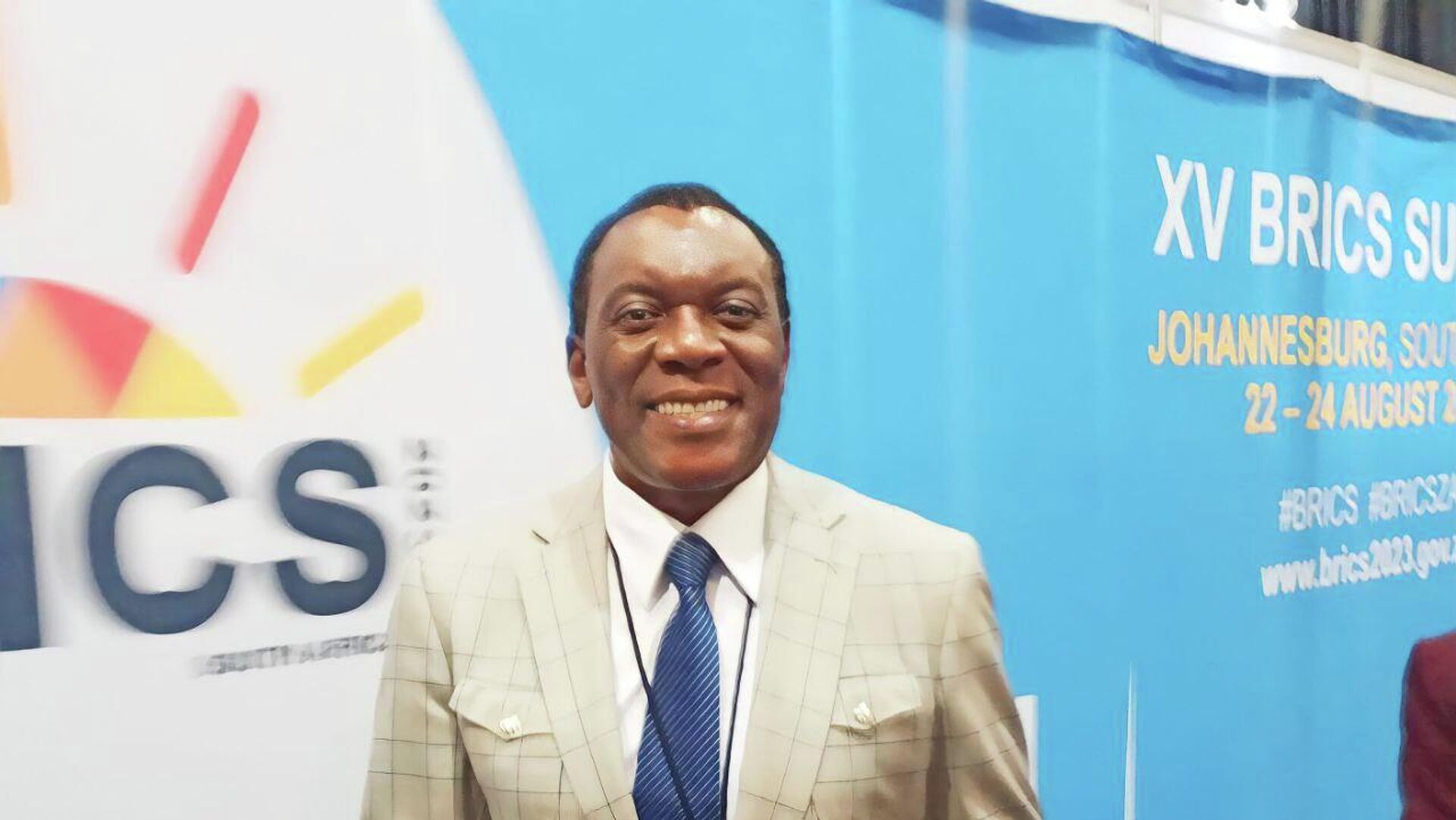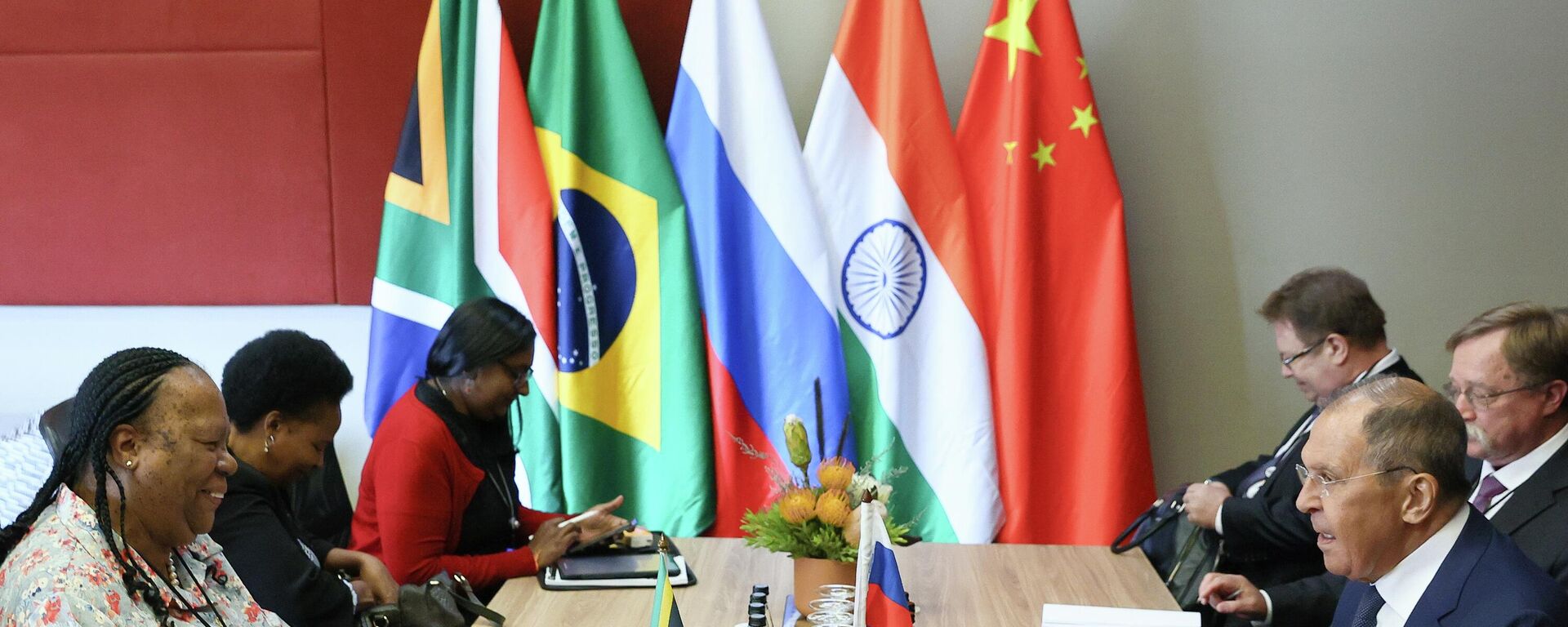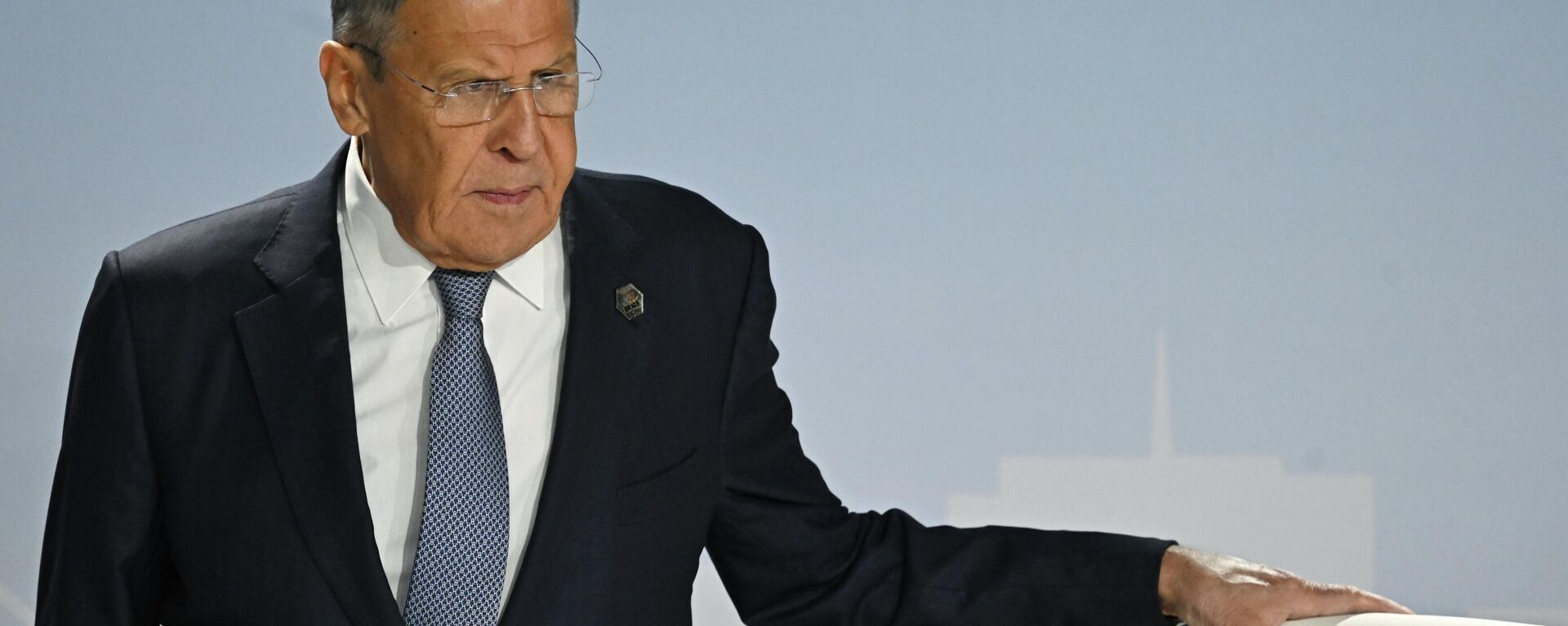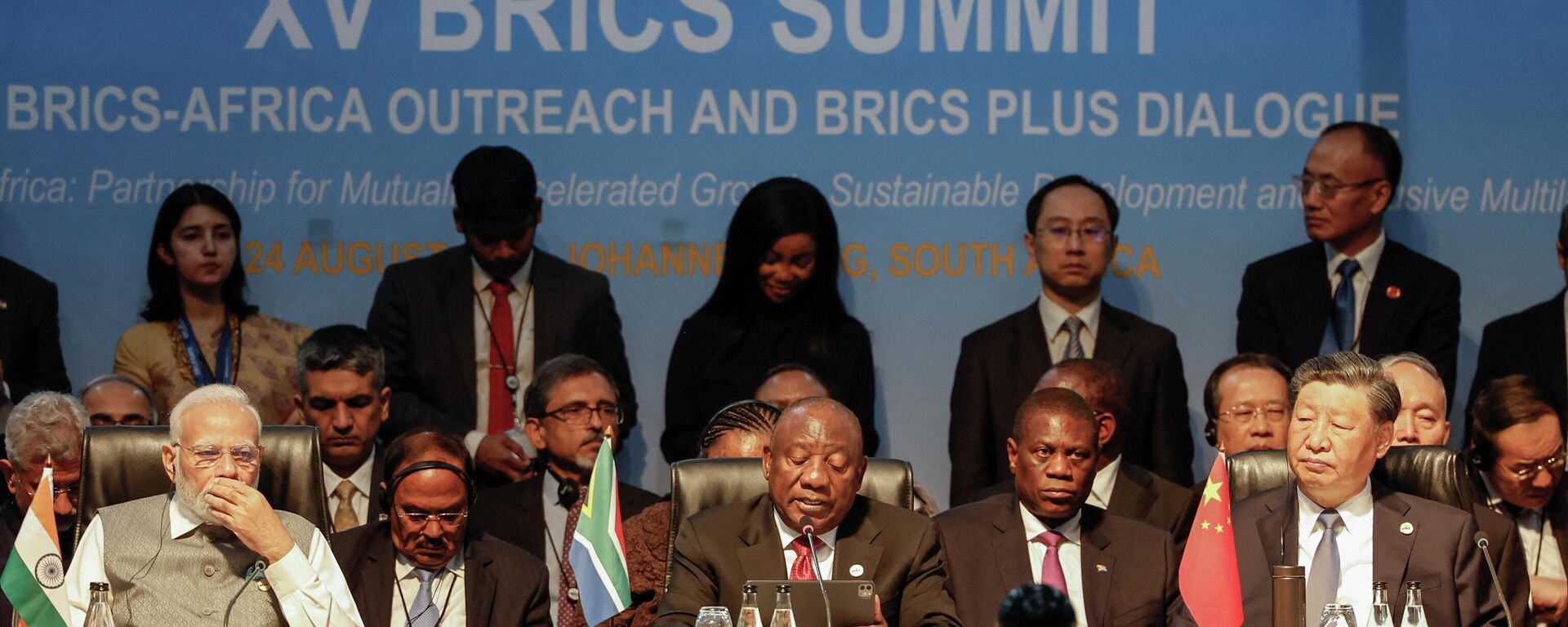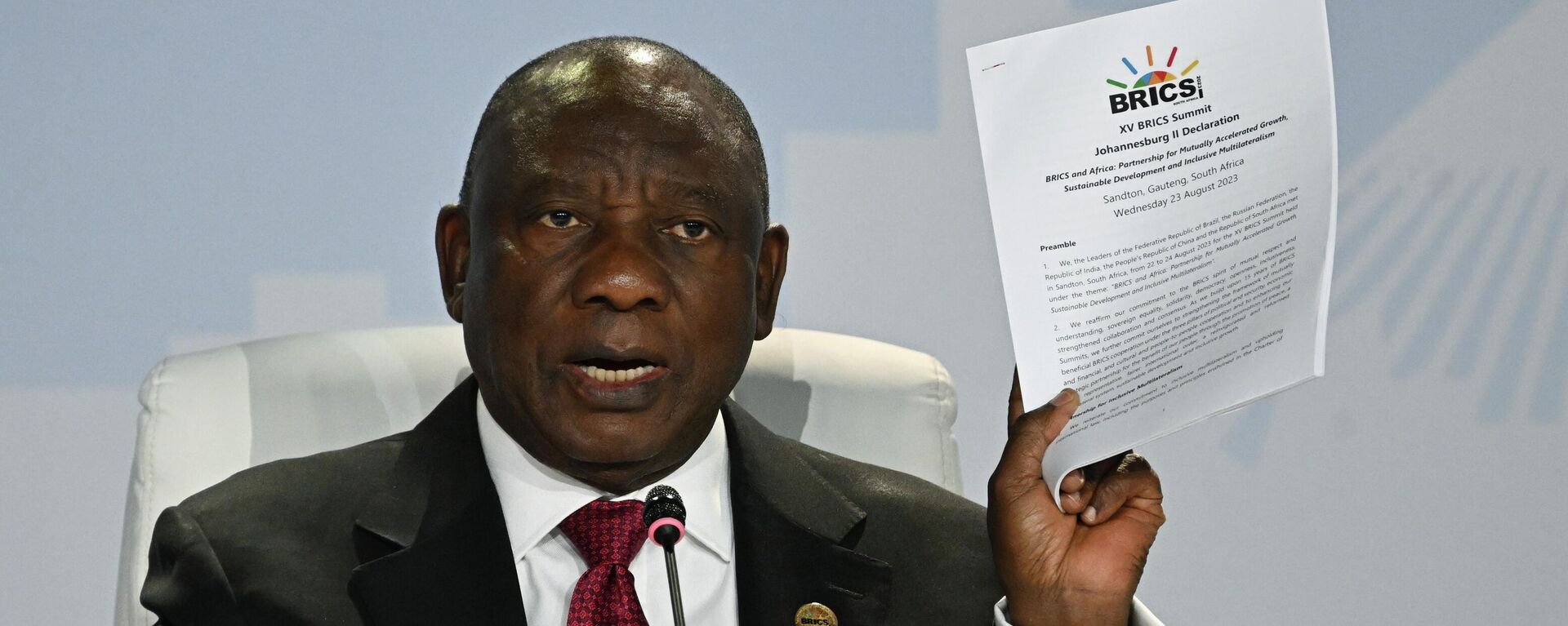https://en.sputniknews.africa/20230824/brics-not-against-us-dollar-but-against-using-currency-to-bully-others-former-sa-minister-1061589822.html
BRICS Not Against US Dollar, But Against Using Currency to 'Bully' Others: Former SA Minister
BRICS Not Against US Dollar, But Against Using Currency to 'Bully' Others: Former SA Minister
Sputnik Africa
The diplomat's remarks come on the last day of the 15th BRICS summit, which is being held in Johannesburg, South Africa, on August 22-24. On that day, the... 24.08.2023, Sputnik Africa
2023-08-24T15:00+0200
2023-08-24T15:00+0200
2023-08-24T15:00+0200
2023 brics summit in johannesburg
southern africa
south africa
brics
brics expansion
brics summit
african continental free trade area (afcfta)
de-dollarization
https://cdn1.img.sputniknews.africa/img/07e7/08/18/1061592367_0:0:1281:721_1920x0_80_0_0_5966e134fccba45191c43d2e465e2387.jpg
Alternative currencies are essential to promote stability in the global trading system and mitigate the impact of unilateral sanctions, according to Dr. Siyabonga Cyprian Cwele, South Africa's Ambassador to China and former Minister of Home Affairs.While not against the US dollar, Ambassador Cwele expressed concerns about its use as a tool for bullying and imposing sanctions that are not based on United Nations mandates. Dr. Cwele told Sputnik Africa while speaking to reporters on the sidelines of the 15th BRICS Summit in Johannesburg, South Africa, that these actions have adverse effects on developing countries, prompting BRICS to explore alternative currencies for trade and economic cooperation.Ambassador Cwele emphasized the importance of utilizing currencies that are not subject to geopolitical manipulation and sanctions. He noted that the BRICS leaders have agreed that their ministers of finance will work on this issue and present a detailed report on potential solutions.According to the diplomat, the exploration of alternative currencies includes considering the use of digital currencies alongside national currencies.Expanding for the Good of the PeopleAmbassador Cwele expressed excitement about the admission of new countries into the BRICS family and emphasized the importance of unity and common vision for development.Highlighting South Africa's own experience as one of the first beneficiaries of BRICS expansion in 2010, Cwele emphasized that BRICS is a partnership for development rather than a bloc against any specific countries. The primary focus is on global development and the inclusion of developing countries' perspectives at the multilateral level.The recent announcement of Argentina, Ethiopia, Egypt, Iran, Saudi Arabia, and the UAE as new members was met with congratulations from Ambassador Cwele, who also mentioned the possibility of welcoming more members next year based on the agreed criteria and methodology.The key principles that bind BRICS together, according to Ambassador Cwele, are a common vision for the development of their people, the pursuit of peace as a catalyst for development, and a commitment to multilateralism over unilateralism. He emphasized that decision-making within BRICS is based on mutual respect, with equal say granted to all member countries regardless of their economic size. Consensus-building ensures that all views are considered, contributing to stronger and more inclusive decision-making processes.Tangible BenefitsDr. Cwele also emphasized the shift toward practical cooperation among BRICS countries. While political agreements have been important, the focus now is on practical cooperation that directly benefits the people.The ambassador highlighted the "tangible benefits" of BRICS cooperation, particularly in the face of the recent COVID-19 pandemic. The New Development Bank, based in Shanghai, provided each member country with a contingency amount of 2 billion USD to help mitigate the impact of the pandemic. According to him, this support demonstrated the practical and beneficial nature of BRICS relations, which extend beyond political agreements and aim to directly benefit the people on the ground.Dr. Cwele added that the statistics speak for themselves, indicating that the BRICS partnership goes beyond rhetoric and delivers meaningful outcomes.BRICS and AfCFTA: Linking CooperationIn his remarks to journalists, the South African diplomat highlighted the alignment between the BRICS partnership and the key objectives of the African Continental Free Trade Area (AfCFTA), underscoring the shared vision of BRICS and the AfCFTA in advancing African development.Dr. Cwele emphasized that industrialization is a critical program for Africa's renewal, in line with the goals of the AfCFTA, launched in 2019, and the African Union's Agenda 2063. He expressed appreciation for the support received from BRICS partners in this endeavor.A key outcome of BRICS cooperation is the coordination of a global economic recovery. Dr. Cwele stressed the importance of opening up industrial supply chains and trade, rather than closing them off.This approach aligns with the principles of the AfCFTA, which seeks to facilitate free trade among African countries and promote economic integration. According to Dr. Cwele, the convergence of BRICS and the AfCFTA in promoting open trade and economic cooperation is crucial to unlocking Africa's economic potential.The former minister highlighted the challenge of energy transition in light of climate change. He acknowledged that developing countries, including those in Africa, are still reliant on fossil fuels but are committed to expanding renewable energy generation.The 15th BRICS Summit, held in Johannesburg, is closing its doors on Thursday.Two African states – Egypt and Ethiopia – have been invited to become full members of BRICS starting January 1, 2024, South Africa's President Cyril Ramaphosa stated during the bloc's leaders' speech at a press-conference at the last day of the BRICS summit.In addition to the two African nations, Argentina, Iran, Saudi Arabia and the United Arab Emirates have been invited to join the bloc early next year. According to the South African president, the admission of the new members is the first phase of the group's expansion process, as more than 20 countries have officially applied to join the bloc.
https://en.sputniknews.africa/20230824/interest-in-brics-membership-based-on-blocs-visible-achievements-s-african-border-official-says-1061580584.html
https://en.sputniknews.africa/20230824/lavrov-reveals-if-brics-name-will-be-changed-after-expansion-1061592017.html
https://en.sputniknews.africa/20230824/brics-expansion-shows-policy-of-unilateralism-on-decline-iranian-president-1061590823.html
https://en.sputniknews.africa/20230824/two-african-counties-join-brics-1061578557.html
southern africa
south africa
Sputnik Africa
feedback@sputniknews.com
+74956456601
MIA „Rossiya Segodnya“
2023
Muhammad Nooh Osman
https://cdn1.img.sputniknews.africa/img/07e7/04/0a/1058467512_0:0:1280:1280_100x100_80_0_0_ec723833bcbfcaed2e21952965ad99e4.jpg
Muhammad Nooh Osman
https://cdn1.img.sputniknews.africa/img/07e7/04/0a/1058467512_0:0:1280:1280_100x100_80_0_0_ec723833bcbfcaed2e21952965ad99e4.jpg
News
en_EN
Sputnik Africa
feedback@sputniknews.com
+74956456601
MIA „Rossiya Segodnya“
Sputnik Africa
feedback@sputniknews.com
+74956456601
MIA „Rossiya Segodnya“
Muhammad Nooh Osman
https://cdn1.img.sputniknews.africa/img/07e7/04/0a/1058467512_0:0:1280:1280_100x100_80_0_0_ec723833bcbfcaed2e21952965ad99e4.jpg
southern africa, south africa, brics, brics expansion, brics summit, african continental free trade area (afcfta), de-dollarization
southern africa, south africa, brics, brics expansion, brics summit, african continental free trade area (afcfta), de-dollarization
BRICS Not Against US Dollar, But Against Using Currency to 'Bully' Others: Former SA Minister
Muhammad Nooh Osman
Writer/Editor
The diplomat's remarks come on the last day of the 15th BRICS summit, which is being held in Johannesburg, South Africa, on August 22-24. On that day, the bloc's leaders will finalize the results of the summit, which took an expanded format with the participation of dozens of countries interested in joining the bloc of emerging economies.
Alternative currencies are essential to promote stability in the global trading system and mitigate the impact of unilateral sanctions, according to Dr. Siyabonga Cyprian Cwele, South Africa's Ambassador to China and former Minister of Home Affairs.
While not against the US dollar, Ambassador Cwele expressed concerns about its use as a tool for bullying and imposing sanctions that are not based on United Nations mandates.
Dr. Cwele told
Sputnik Africa while speaking to reporters on the sidelines of the
15th BRICS Summit in Johannesburg, South Africa, that these actions have adverse effects on developing countries, prompting BRICS to explore alternative currencies for trade and economic cooperation.
"I just want to put this thing, we are not against the dollar, but what we are against is the use of currencies, which are used for trade, for bullying others, for pushing sanctions which are not UN-based, which causes problems to all of us, because those sanctions against Russia and others now are having an impact on developing countries," he said.
Ambassador Cwele emphasized the importance of utilizing currencies that are not subject to geopolitical manipulation and sanctions. He noted that the BRICS leaders have agreed that their ministers of finance will work on this issue and present a detailed report on potential solutions.
According to the diplomat, the exploration of alternative currencies includes considering the use of digital currencies alongside national currencies.
"So we are looking at alternative currencies, we are looking at trading with our own moneys. We are looking at the new currencies, including digital currencies, whether we can utilize those so that there can be stability in the global trading system," the South African envoy told Sputnik Africa.
Expanding for the Good of the People
Ambassador Cwele expressed excitement about the admission of new countries into the BRICS family and emphasized the importance of unity and common vision for development.
Highlighting South Africa's own experience as one of the first beneficiaries of BRICS expansion in 2010, Cwele emphasized that BRICS is a partnership for development rather than a bloc against any specific countries. The primary focus is on global development and the inclusion of developing countries'
perspectives at the multilateral level.
"We are a partnership for development. We are not a bloc. We are not against anyone, but we are concerned about global development and inclusion of the views of developing countries, particularly at the multilateral level," the envoy told reporters. "That's why we all talk about the reform of this institution to accommodate the needs and aspirations of developing countries."
The recent announcement of Argentina, Ethiopia, Egypt, Iran, Saudi Arabia, and the UAE as new members was met with congratulations from Ambassador Cwele, who also mentioned the possibility of
welcoming more members next year based on the agreed criteria and methodology.
"We think that maybe next year, more and more members would be welcome, because now we are clear on the criteria. Here in Johannesburg, South Africa, our leaders agreed on the criteria, methodology and the systems, which are needed for you to join this BRICS family," the diplomat said.
The key principles that bind BRICS together, according to Ambassador Cwele, are a common vision for the development of their people, the pursuit of peace as a catalyst for development, and a commitment to multilateralism over unilateralism.
He emphasized that decision-making within BRICS is based on mutual respect, with equal say granted to all member countries
regardless of their economic size. Consensus-building ensures that all views are considered, contributing to stronger and more inclusive decision-making processes.
"What is even more important, I think some of the people don't know, how does BRICS take decisions? BRICS is a forum of mutual respect, and they is no bullying because your economy is bigger than mine. We have equal say. We have got mutual respect. Our leaders respect each other, as much as we have got different policies," the former minister said.
Dr. Cwele also emphasized the shift toward practical cooperation among BRICS countries. While political agreements have been important, the focus now is on practical cooperation that directly benefits the people.
The ambassador highlighted the "tangible benefits" of BRICS cooperation, particularly in the face of the recent COVID-19 pandemic. The New Development Bank, based in Shanghai, provided each member country with a contingency amount of 2 billion USD to help mitigate the impact of the pandemic.
According to him, this support demonstrated the practical and beneficial nature of BRICS relations, which extend beyond political agreements and aim to directly benefit the people on the ground.
"So people are seeing these beneficial relations. If you look at trade between our BRICS countries, I speak from the South African perspective, since we joined in 2010, our trade with these countries has increased," he told reporters.
Dr. Cwele added that the statistics speak for themselves, indicating that the BRICS partnership goes beyond rhetoric and delivers meaningful outcomes.
BRICS and AfCFTA: Linking Cooperation
In his remarks to journalists, the South African diplomat highlighted the alignment between the BRICS partnership and the key objectives of the African Continental Free Trade Area (AfCFTA), underscoring the shared vision of BRICS and the AfCFTA in advancing African development.
Dr. Cwele emphasized that industrialization is a critical program for Africa's renewal, in line with the goals of the AfCFTA, launched in 2019, and the African Union's Agenda 2063. He expressed appreciation for the
support received from BRICS partners in this endeavor.
"It is important that we are getting this support now from our BRICS partners. All of them are committing to work to industrialize because that's a very important program for the renewal of Africa from Agenda 2063. And our President has been really driving this process with his counterparts in the African continent," the diplomat stated.
A key outcome of BRICS cooperation is the coordination of a global economic recovery. Dr. Cwele stressed the importance of opening up industrial supply chains and trade, rather than closing them off.
This approach aligns with the principles of the
AfCFTA, which seeks to facilitate free trade among African countries and promote economic integration. According to Dr. Cwele, the convergence of BRICS and the AfCFTA in promoting open trade and economic cooperation is crucial to unlocking Africa's economic potential.
The former minister highlighted the challenge of energy transition in light of climate change. He acknowledged that developing countries, including those in Africa, are still reliant on fossil fuels but are committed to expanding renewable energy generation.
"We are still developing countries, but we are playing a leading role in terms of bringing renewable energy while we are still using the fossils because we are still developing," he said. "But even the fossil technologies, you'll find that BRICS countries are cooperating in terms of bringing the technologies to reduce the emissions, even in that coal generation."
The 15th BRICS Summit, held in Johannesburg, is closing its doors on Thursday.
Two African states – Egypt and Ethiopia –
have been invited to become full members of BRICS starting January 1, 2024, South Africa's President Cyril Ramaphosa stated during the bloc's leaders' speech at a press-conference at the last day of the BRICS summit.
In addition to the two African nations, Argentina, Iran, Saudi Arabia and the United Arab Emirates have been invited to join the bloc early next year. According to the South African president, the admission of the new members is the first phase of the group's expansion process, as more than 20 countries have officially applied to join the bloc.
